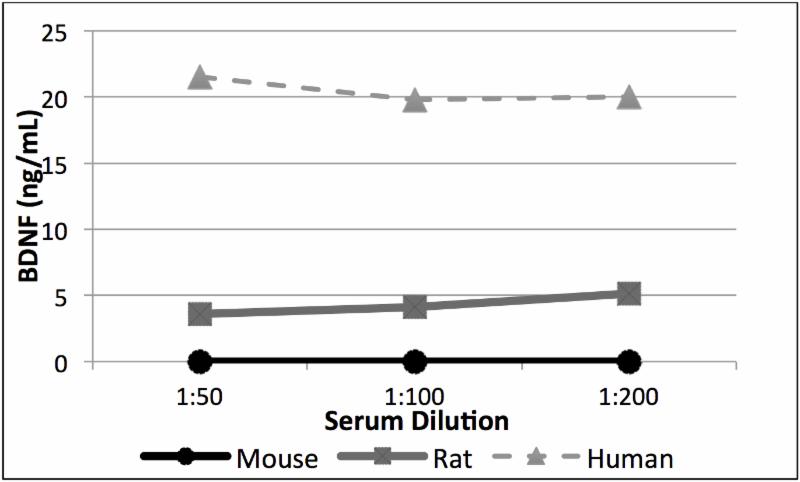|
|
|
"WHAT'S THE DIFFERENCE?" - QUANTIFICATION OF BDNF IN SERUM AND PLASMA, AND THE IMPORTANCE OF SAMPLE PREPARATION
Dear Doctor,
Blood represents an easily accessible body fluid useful to monitor changes in BDNF concentration, but debate continues about which blood fraction is the correct one to use! The right choice of sample preparation procedure is at least as critical as choosing an accurate, reproducible and validated ELISA assay, yet, it is one of the steps most easily overlooked in BDNF quantification!
In addition, results from BDNF measurements obtained from animal studies will not correlate to humans, since endogenous BDNF concentrations show high inter-species variability. Thus, this newsletter discusses important aspects for the accurate and reproducible quantification of BDNF by ELISA, particularly in blood.
|
|
|
Mature BDNF Rapid™ ELISA Kit
|
Image of our Mature BDNF
Rapid™ ELISA kit (Catalog No: BEK-2211). 'proBDNF interference is minimal and the truncated isoform is not detected!'
|
|
|
|
REPORTED BDNF CONCENTRATIONS IN BLOOD ARE HIGHLY VARIABLE
|
In excess of 1,200 published studies within the past 20 years suggest that changes in BDNF blood concentration are useful to monitor the course of neurological and psychiatric disease in patients, thus serving as a potential biomarker. However, the observed concentrations of BDNF in the blood of healthy subjects vary by as much as 500 fold! (Table 1).
Table 1: Range of reported BDNF concentrations in blood fractions of healthy controls.

Based on meta-analysis conducted by Green et al., 2010.
Platelets are the main source for BDNF in human blood and are able to take up or secrete BDNF (Fujimura et al., 2002) and platelet degranulation can occur upon activation during sample processing. Thus, sample preparation of human blood is an essential step in accurate quantification of BDNF.
|
SAMPLE PREPARATION AFFECTS BDNF QUANTIFICATION IN HUMAN BLOOD
|
Release of BDNF occurs through shear forces and clotting during serum preparation. A recent analysis by Tsuchimine et al., (2014), demonstrated that BDNF plasma values are highly variable due to choice of anti-coagulant, incubation time and temperature. Serum BDNF concentrations, however, reached a plateau value after 1 hour incubation, indicating maximum release of BDNF from platelets, and remained constant for up to 48 hours regardless of temperature.
Upon maximum BDNF release, normal BDNF concentrations in human serum reach median values of 20-25 ng/mL (Polacchini et al., 2015). Additionally, serum samples stored at -80°C for 1 year show no signs of degradation suggesting stability under these storage conditions.
Biosensis therefore suggests to use human serum rather than plasma to quantify BDNF and to limit sample variability. It also is advisable to store aliquoted serum samples at -80°C while avoiding freeze-thaw cycles.
|
|
BDNF CONTENT VARIES AMONG ANIMAL SPECIES
|
The amino acid sequence of mature BDNF is identical among human, mouse, rat and numerous other species. Despite 100% sequence homology, the physiological role of BDNF may be different in human and rodents as evidenced by their different concentration in blood. While normal human serum contains high concentrations of BDNF (20-25 ng/mL), rat serum contains much lower values (less than 5 ng/mL), while mouse serum BDNF values are non-detectable with traditional ELISA assays (Figure 1) as mice lack the ability to product BDNF in platelet precursors, the megakaryocytes (Chacon-Fernandez et al., 2016).

Figure 1: BDNF content in human, rat and mouse sera quantified with the Mature BDNF Rapid™ ELISA kit (Catalog No: BEK-2211). These results correlate with published data in that inter-species serum samples vary in their mature BDNF concentration (Klein et al., 2011) and (Radka et al., 1996). Note: these results have been adjusted for the dilution factor.
P.S. A recent independent research study shows Biosensis' Mature BDNF Rapid™ ELISA Kit (Catalog No: BEK-2211) outperforms 5 other major competitor kits in terms of assay duration, reproducibility & sensitivity! (Polacchini et al., 2015).
|
At Biosensis, we are committed to providing highest-quality products with easy-to-follow instructions that incorporate the latest information from the research community. Please visit our website to learn more about our BDNF Rapid™ ELISA Kit (Catalog No: BEK-2211), proBDNF Rapid™ ELISA Kit (Catalog No: BEK-2217) and other BDNF-related research reagents here. If you have a query on any of our products, one of our experienced researchers can help at biospeak@biosensis.com.
Until next time, good luck with your research.
Sincerely,
The Biosensis Team
Contact Information
Biosensis Pty Ltd
Address: 40-46 West Thebarton Road
Thebarton SA 5031 Australia
Email: info@biosensis.comPhone: +61 8 8352 7711 - In the United States, call us in California toll free on 1800 605-5127
Web: www.biosensis.com
P.S. Missed any of our previous newsletters? Please access our newsletter archive here.
|
|
|
|
|
|
|